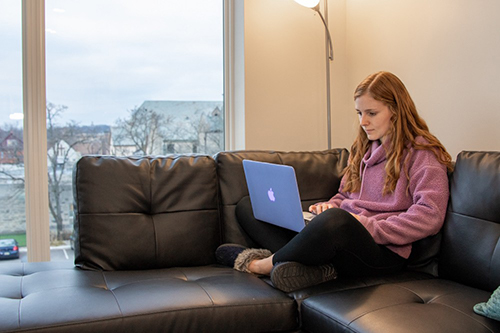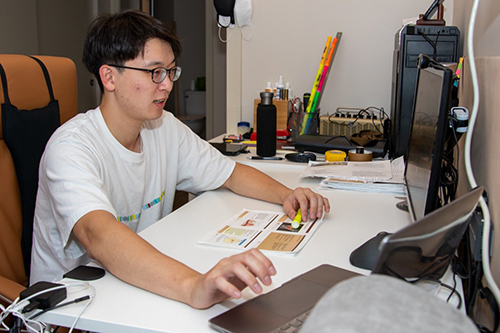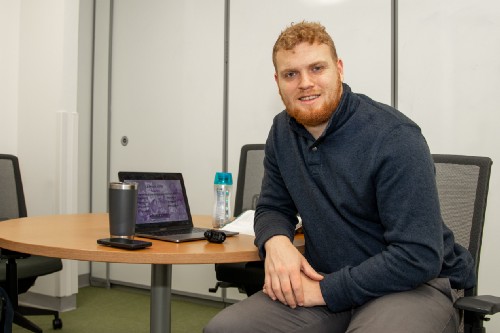
Story and Photos Courtesy of the WMed Medical Multimedia Journalists Interest Group
It’s 8 a.m. on a Tuesday morning in October. Jessica Edwards, a first-year student at Western Michigan University Homer Stryker M.D. School of Medicine (WMed), sits in her Kalamazoo apartment trying to watch a lecture about genetic diseases. She finds it difficult to focus. Between large gulps of water, she tries to pay attention, but her brain is just too foggy.
“It was very hard to be a good medical student,” said Edwards recounting her experience having COVID-19. “That Tuesday I woke up and I was really feeling not that great. It felt like I’d been hit by a bus.”
Edwards quarantined herself in her apartment for two weeks as she recovered.
“Thankfully, I had a very mild case as far as they come,” she said.
In October 2020, several students at WMed contracted COVID-19, mirroring the rise of infections across Michigan and the entire country. This prompted leaders at the medical school to temporarily switch to an all-virtual format for many learners, including first-year medical students like Edwards. In addition, the school gave students the option at that time to postpone their upcoming exam by three days.
“I’m really thankful that our school recognized that was happening for a lot of us,” Edwards said. “I really needed those extra days to study.”
Since the school welcomed its newest cohort of 84 medical students — the MD Class of 2024 — in July, the students have followed a hybrid curriculum, dynamically shifting between varying levels of virtual and in-person learning. After their arrival to WMed, first-year medical students were still able to participate in some clinical experiences. Edwards said she had two shadowing experiences at the Ascension Borgess Hospital pharmacy and Senior Care Partners P.A.C.E.
“It was right after our white coat ceremony,” Edwards said. “So, it was very exciting to get to put the white coat on and head in there.”
She recalled going on a home visit with a nurse practitioner to an apartment infested with cockroaches and bedbugs.
“It was a good reminder that we’re going to be treating patients from all walks of life and it’s really important to understand their home situation and integrate that into their plan of care,” Edwards said.
Since then, those types of clinical experiences have moved online or been suspended.
“I’m hopeful that given that we’re M1s we’re going to have time to catch up with all this,” Edwards said.

In November, with COVID-19 cases continuing to rise nationally and locally, the medical school announced an all-virtual curriculum until January 2021 for first- and second-year students. For another first-year medical student, Sung Jik Cha, the virtual experience is quite different from what he had expected and hoped for when he was accepted to WMed.
Cha was working as a software engineer when he decided to change careers and become a physician.
“The whole reason that I wanted to do a career change from software engineering was to have more direct interactions with people,” Cha said. “I wanted to get away from a screen.”
Ironically, his medical school experience thus far has been primarily in front of a screen.
Cha said he prefers interacting with professors and classmates in-person.
“I think it’s easier to ask questions when I’m in-person seeing the professor face to face,” he said. “I can wait till the end of lecture to walk up and ask questions without feeling like I am slowing down the class.”
Cha said in-person discussions with classmates are easier, too.
“It’s easier to have discussions because you can read body language and see facial expressions,” he said.
Face-to-face meetings are risky during this pandemic, but Cha said he is confident in his classmates to stay safe and look out for each other.
“I trust my classmates to not come to in-person events if they have symptoms or if they test positive,” he said. Cha himself has been tested three times for COVID-19. The tests were all negative.

The experience of in-person medical school events is fresh in the mind of Lucas Bezerra. Bezerra is a first-year medical student who completed the Master of Science in Biomedical Sciences program at WMed last year. During the pursuit of his master’s degree, Bezerra shared some classes with first-year medical students and participated in parts of their curriculum.
Bezerra said the transition to virtual classes has not been easy.
“I don’t like sitting at a computer for hours a day and watching a lecture then studying on a computer. I like to attend lecture in-person,” he said. “It’s good that they can still teach virtually in a time like this instead of postponing for a year. So, I don’t mind that much.”
Lucas said this first year has taken a lot of adaptation.
“We have never done medical school like this before,” he said. “There’s going to be some learning curves coming up.”
Last year, Bezerra participated in several interest groups, informal clubs where students get to meet and learn from physicians who practice different medical specialties.
“There are some areas that I’m interested in and I’m also open to seeing other stuff, which is why I’m kind of upset about virtual learning right now,” he said. “Last year, a bunch of organizations could do stuff to show you and highlight the skills of other professions.”
He said that he learned how to do spinal taps on manikins in the WMed Simulation Center and learned different procedures like suturing techniques from the residents. This year, he said, first-year students are missing out on these hands-on, skill-based learning opportunities.
Wellness is another aspect that Bezerra thinks has taken a hit during the pandemic.
“Med school is tough. We all know it’s tough,” Bezerra said. “WMed did a tremendous job last year of doing little workshops to boost morale, to get you happy.”
He said medical school leaders would bring dogs in, make hot cocoa in the winter, and make Valentine cards. He said you don’t really get this in the virtual environment. Although the school still holds wellness activities for students, the activities are all virtual this year.
Bezerra said this environment can be detrimental to students’ mental health and without a good friend group it can be a slippery slope. He is thankful for his two roommates who are also first-year medical students. They can talk together in-person and play sports.
He said he looks forward to a return to normal. Earlier in the academic year, he got to put on his white coat and observe radiologists at Bronson Methodist Hospital.
“I loved it,” Bezerra said. “They told me a bunch of the ins and outs of what to do if I was a resident.”
Cha said he also looks forward to a post-COVID future.
“I’m still hopeful that once COVID ends we’ll get a more traditional medical school experience,” he said.
For Edwards, she said she is thankful to be a first-year medical student now considering that she is still in the pre-clinical phase of the curriculum.
“I’m happy this isn’t impacting our education more than it already is,” she said, comparing her situation to that of third- and fourth-year students whose instruction primarily takes place within the hospital. “We lucked out in that regard.”
